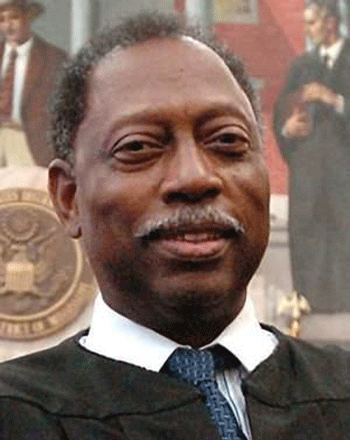
U.S. Judge Henry Wingate
Paul Minor, one of the most successful plaintiffs' lawyers in Mississippi history, has been released from prison on his Bush-era conviction for "crimes" that do not exist under actual law. Minor's legal problems, however, are far from over. With U.S. District Judge Henry Wingate still in charge of his fate, things could go from bad to worse for Paul Minor.How could Wingate, a black Republican who apparently qualifies as Mississippi's version of Clarence Thomas, still be in charge of Minor's fate? After all, Wingate presided over multiple criminal trials in the Minor matter; how could he possibly serve as an impartial arbiter in a related civil matter?
The answer is, "He can't, but he's doing it anyway--in what's left of our so-called U.S. justice system."
As part of the fallout from the criminal case, insurance giant USF&G sued Minor and his one-time client, Peoples Bank of Biloxi, Mississippi. The basic claim is that Minor and the bank benefited from actions that were found to be unlawful. The civil case was filed in 2003, but it was put on hold pending the criminal matter. When Minor was released from prison earlier this year, the civil case kicked into high gear.
A reasonable citizen might ask, "How could the same judge hear both cases? He's heard the evidence, he's issued orders on various matters . . . how could he possibly be an impartial arbiter in the civil matter when he's already ruled on pretty much the same issues in the criminal matter?"
Under the law, such a citizen is asking all of the right questions. Per 28 U.S. Code 455, a federal judge must disqualify himself in "any proceeding where his impartiality might reasonably be questioned." That means Wingate was required by law to step down from the Minor civil case, without being asked. But so far, the judge has resisted all of Minor's efforts to get him off the case.
Even if Wingate had handled the criminal case in an impeccable manner, he should not be hearing the related civil matter. But Wingate's recalcitrance becomes especially troubling when you consider that he butchered the criminal case in almost every way imaginable.
Here are just two of many posts we've written about the botch job Wingate committed on U.S. v. Minor, et al:
Henry Wingate: Portrait of a Corrupt Judge (January 28, 2008)
Judge In Paul Minor Case Continues His Evil Ways (June 14, 2011)
We are not alone in our critique of Wingate's actions. Columbia University law professor Scott Horton called some of Wingate's rulings in the criminal case "breathtaking" and "unconscionable" in a 2007 article for Harper's.
USF&G's lawyers, from the Jackson, Mississippi, firm of McCraney, Montagnet, Quin & Noble, almost surely know they have no legal basis for the civil claim. They apparently have the judge in their hip pocket, however, so the case is proceeding apace.
Consider just some of the facts and law connected to the criminal case:
* USF&G claims that it was the victim of a fraudulent scheme involving Minor and former Mississippi Chancery Judge Wes Teel in the underlying Peoples Bank case. But USF&G voluntarily settled the case, and Teel did not even issue a final ruling in the matter. He did favor Peoples Bank at summary judgment on the issue of liability, but that finding was in line with prevailing Mississippi law at the time. Where is fraud in a case that USF&G voluntarily settled?
* At the heart of USF&G's civil complaint is the contention that it was the victim of a bribery scheme involving Minor and Teel. But the U.S. Fifth Circuit Court of Appeals overturned all of the bribery-related convictions in 2009. The remaining convictions essentially rested on an honest-services fraud charge.
* In the aftermath of the U.S. Supreme Court's ruling in Skilling v. U.S., 28 S. Ct. 2896 (2010), honest-services convictions can stand only in cases where bribes or kickbacks are involved. As already shown, the bribery convictions in the Minor criminal case were overturned. And kickbacks were not even alleged.
That leaves us asking this question about the USF&G civil case: Where's the beef? The case rests on . . . well, almost nothing. But the firm is seeking $12.5 million in compensatory and punitive damages anyway.
Minor probably has grounds to seek Rule 11 sanctions against USF&G lawyers for bringing a nonmeritorious case for the purposes of harassment. He also probably has grounds for an abuse of process claim against USF&G and its attorneys.
With Henry Wingate on the case, what are the chances that a Ronald Reagan appointee would hold an insurance company and its lawyers accountable for bringing a baseless civil complaint?
The chances are slim, but the public should pay close attention to Henry Wingate's actions in USF&G v. Minor. It's a classic study of a federal judge who is so arrogant that he doesn't even try to hide his favoritism toward a corporate litigant. And the corporation seems happy to benefit from the law being bent like a pretzel.
